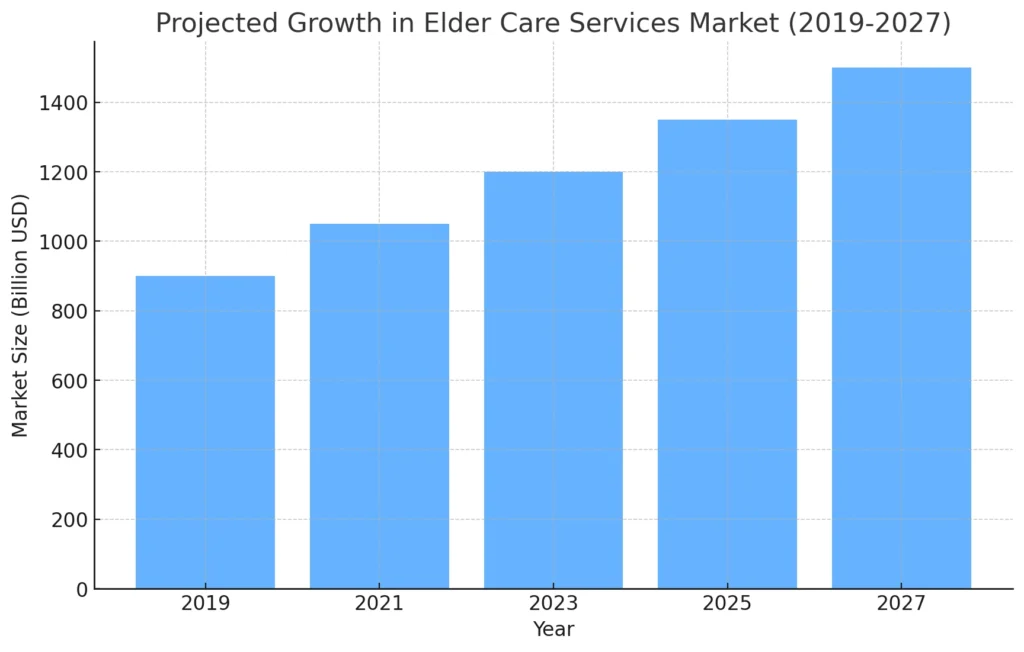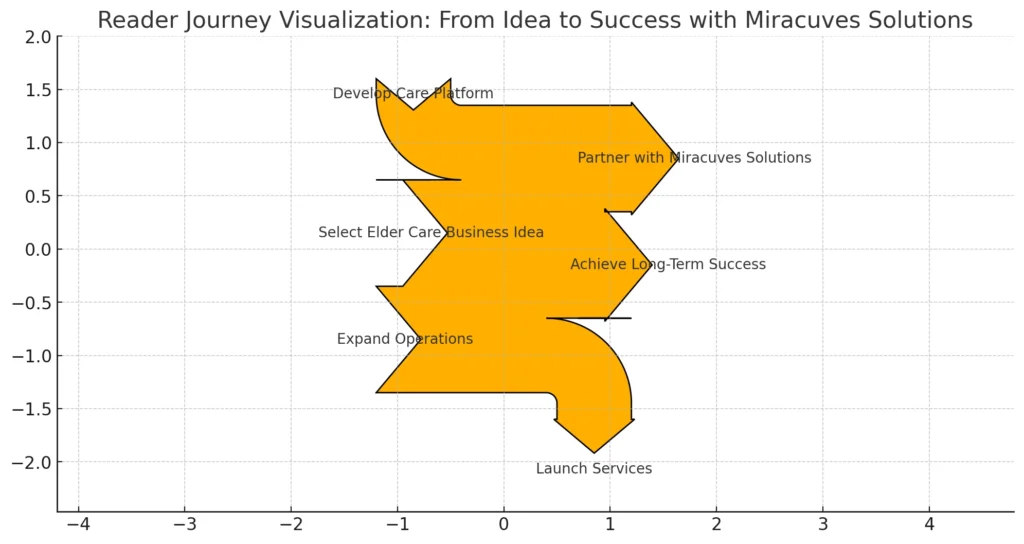With the global population aging rapidly, the demand for elder care services is at an all-time high. Seniors today seek not only medical care but also non-medical support that enhances their quality of life. Families are increasingly looking for professional services that ensure their elderly loved ones receive personalized care, comfort, and attention, whether at home or in assisted living facilities. This growing need makes the elder care sector one of the most promising industries for entrepreneurs.
Advances in healthcare technology and shifting societal trends have opened new doors for elder care businesses. Services such as in-home care, remote health monitoring, and senior-focused wellness programs have become essential. As people live longer, there is also rising demand for companionship services, transportation assistance, and help with day-to-day activities. This business sector not only offers opportunities for financial growth but also the chance to make a meaningful impact on people’s lives.
Why Choose Elder Care Services Business?
The elder care industry is booming, driven by a rising senior population and evolving family dynamics. More people are looking for reliable care solutions to support their aging parents and relatives, especially with modern lifestyles leaving families stretched for time. Elder care services not only fill this gap but also offer a chance to provide meaningful help to those in need. This growing demand makes starting an elder care business both a rewarding and profitable venture.
With a variety of service options—such as in-home care, companionship services, transportation, and remote health monitoring—businesses can cater to the specific needs of seniors. Entrepreneurs can focus on non-medical care, which involves assistance with daily tasks, or they can explore specialized medical services such as hospice care or therapy. The flexibility of this industry allows businesses to start small and scale as demand grows.
Technology plays a significant role in the future of elder care. Remote monitoring tools, health tracking devices, and AI-powered care platforms are transforming how caregivers deliver support. These technologies ensure that seniors receive quality care while giving their families peace of mind. Entrepreneurs who adopt these innovations will be well-positioned for success as they meet the needs of an aging population.
Read More “Top 10 Ideas for Babysitting and Child Care Business Startups“

Current Trends and Future Opportunities in Elder Care
The elder care industry is evolving rapidly, fueled by new technologies and innovative care models. As people live longer and healthier lives, the demand for personalized and proactive care solutions is increasing. One of the most significant trends is in-home care services, allowing seniors to age comfortably in familiar surroundings. This shift from traditional nursing homes to home-based care opens opportunities for businesses offering support such as meal preparation, companionship, and mobility assistance.
Remote health monitoring is another game-changer. Wearable devices and smart sensors now enable caregivers to monitor vital signs and activity levels from a distance, ensuring that seniors receive timely care without constant in-person supervision. These tools also give family members peace of mind by providing regular updates on their loved one’s well-being.
AI-powered platforms and care apps are gaining traction, automating appointment scheduling, medication reminders, and health tracking. These technologies not only make care delivery more efficient but also ensure better health outcomes by minimizing human error. Businesses that integrate AI with human caregiving services will have a competitive edge.
Companionship and mental wellness services are also becoming more popular. As loneliness becomes a major issue among the elderly, services that offer social interaction—such as virtual clubs, hobby groups, and companionship programs—play a vital role in improving mental health. These programs are crucial, as they address the emotional and psychological needs of seniors alongside physical care.
The future of elder care lies in personalization and technology-driven care models. Businesses that blend compassionate care with innovative tools will be well-positioned to meet the growing demand, ensuring both profitability and meaningful impact.
The rise of remote health monitoring has reshaped elder care services, enabling caregivers to track vital signs and wellness data in real-time. These technologies enhance safety by providing early alerts and allow seniors to receive care without frequent in-person visits, making the service both efficient and reliable.
Here You Can Also Read About Ideas for Online Therapy and Wellness Coaching Business
| Trend / Technology | Impact on Elder Care | Opportunities for Startups |
|---|---|---|
| In-Home Care Services | Enables aging in place | Offer flexible, non-medical home support |
| Remote Health Monitoring | Enhances safety and care quality | Develop wearable health tracking solutions |
| AI-Powered Care Platforms | Automates tasks, improves outcomes | Build AI-enhanced apps for care management |
| Mental Wellness and Companionship | Improves emotional well-being | Launch virtual or in-person social programs |
Top 10 Ideas for Elder Care Services Business Startups
| Business Idea | Startup Cost Range | Target Market | Profit Potential |
|---|---|---|---|
| In-Home Care Services | Medium | Aging-in-place seniors | High |
| Remote Health Monitoring | High | Seniors with chronic health needs | Very High |
| Senior Transportation Services | Medium | Mobility-challenged seniors | Moderate |
| Companionship and Mental Wellness Programs | Low to Medium | Isolated seniors | High |
| Mobile Health Clinics | High | Seniors with limited mobility | Very High |
| Elderly Meal Delivery | Medium | Seniors needing healthy meals | High |
| Memory Care and Cognitive Therapy | Medium to High | Seniors with dementia | High |
| Senior Fitness and Wellness Programs | Low to Medium | Active seniors and therapy patients | Moderate to High |
| Legal and Financial Advisory Services | Medium | Seniors planning their future | Moderate |
| Technology Training for Seniors | Low | Seniors learning digital tools | Moderate to High |
1. In-Home Care Services
Offer personalized non-medical support, such as help with household chores, meal preparation, and companionship, allowing seniors to live comfortably at home.
- Target Market: Elderly individuals preferring to age in place
- Estimated Costs: Medium (Staff, transportation, scheduling tools)
2. Remote Health Monitoring Services
Provide wearable devices and monitoring tools that track vital signs, enabling caregivers to offer remote support and early intervention.
- Target Market: Seniors with chronic health conditions
- Estimated Costs: High (Technology, monitoring software, licenses)
3. Senior Transportation Services
Launch a transportation service that helps seniors with mobility issues reach medical appointments, social activities, and grocery stores safely.
- Target Market: Seniors needing transportation support
- Estimated Costs: Medium (Vehicles, insurance, driver wages)
4. Companionship and Mental Wellness Programs
Offer in-person or virtual programs focused on reducing loneliness and promoting mental well-being through social interactions, hobbies, and support groups.
- Target Market: Seniors experiencing isolation
- Estimated Costs: Low to Medium (Program coordinators, activity materials)
5. Mobile Health Clinics for Seniors
Create mobile clinics that provide routine check-ups, vaccinations, and healthcare services directly to seniors’ homes.
- Target Market: Seniors with limited mobility
- Estimated Costs: High (Medical equipment, vehicles, staff)
6. Elderly Meal Delivery Service
Deliver nutritious meals designed specifically for seniors, focusing on dietary restrictions and health needs.
- Target Market: Seniors needing healthy meal options
- Estimated Costs: Medium (Kitchen, delivery logistics)
7. Memory Care and Cognitive Therapy Services
Offer specialized care for seniors with dementia or Alzheimer’s through cognitive therapy and activities that boost memory and cognitive function.
- Target Market: Seniors with memory-related conditions
- Estimated Costs: Medium to High (Training, therapy equipment)
8. Senior Fitness and Wellness Programs
Develop fitness programs tailored for seniors, focusing on light exercises, yoga, and physical therapy to maintain mobility and health.
- Target Market: Active seniors and those needing physical therapy
- Estimated Costs: Low to Medium (Instructors, equipment)
9. Legal and Financial Advisory Services for Seniors
Provide specialized advice on wills, trusts, retirement planning, and healthcare directives, helping seniors make informed decisions.
- Target Market: Seniors planning their financial future
- Estimated Costs: Medium (Legal experts, advisors)
10. Technology Training for Seniors
Offer training programs that help seniors use smartphones, tablets, and other digital tools to stay connected with family and access online services.
- Target Market: Seniors learning digital tools
- Estimated Costs: Low (Trainers, devices, course materials)
Real-World Examples
The elder care industry is filled with inspiring examples of how businesses have creatively addressed the needs of seniors. In-home care services have become increasingly popular, with startups focusing on personalized care that allows seniors to maintain their independence. These companies provide support with daily activities, companionship, and non-medical care, building strong relationships with their clients. The ability to adapt to individual needs has made these businesses essential for families looking for flexible elder care solutions.
Another successful model is remote health monitoring services, which have transformed care for seniors with chronic conditions. Startups offering wearable devices and real-time monitoring platforms have made it possible for caregivers to respond quickly to emergencies. This proactive approach not only enhances care quality but also provides peace of mind for families who may not live close to their elderly relatives.
Companionship and mental wellness programs have also seen significant success. With social isolation becoming a growing concern among seniors, businesses that offer group activities, virtual meetups, and one-on-one companionship services have filled an important gap. These services promote emotional well-being and create meaningful connections, enriching the lives of their elderly clients.
Some startups have introduced meal delivery services that focus on senior nutrition. These companies prepare healthy, customized meals designed for specific dietary needs, helping seniors maintain good health. Combining convenience with health-focused care, these businesses have become trusted partners in elder care.
| Business Model | Success Rate (%) | Common Challenges |
|---|---|---|
| In-Home Care Services | 85% | Managing caregiver availability |
| Remote Health Monitoring | 80% | Ensuring seamless tech integration |
| Companionship and Mental Wellness Programs | 75% | Keeping clients engaged long-term |
| Senior Meal Delivery Services | 70% | Managing delivery logistics and freshness |
Mistakes to Avoid When Starting an Elder Care Business
The elder care industry offers great opportunities, but like any business, it has its challenges. Understanding and avoiding common mistakes can make all the difference between a thriving startup and one that struggles to find its footing.
1. Skipping Regulatory Compliance
Providing care to seniors involves following strict laws and regulations. Businesses that fail to secure the proper licenses or meet health and safety standards risk facing legal trouble or even closure. Staying updated on local regulations and maintaining compliance from day one is essential.
2. Inconsistent Service Quality
Inconsistent care or poor service can damage a business’s reputation quickly. Elder care requires compassion, patience, and reliability. Failing to meet client expectations—whether due to untrained staff or scheduling issues—can lead to lost trust. Hiring well-trained caregivers and building strong processes ensures quality care.
3. Lack of Clear Communication with Families
Families want to be informed about their loved ones’ care regularly. Businesses that don’t provide timely updates or communication with families may lose clients. Building strong relationships through clear, regular communication can improve customer satisfaction and retention.
4. Poor Staff Management
High turnover rates are common in caregiving roles, which can impact service consistency. Burnout and a lack of support for caregivers often lead to poor staff retention. Offering competitive wages, proper training, and supportive work environments can help maintain a motivated workforce.
5. Ignoring Technology and Innovation
Some businesses rely on traditional methods and miss the opportunity to improve care through technology. Integrating tools like health monitoring apps, automated reminders, and scheduling software can streamline operations and enhance service quality.
Staying compliant with healthcare regulations is critical for maintaining trust and avoiding legal issues. Elder care services must follow industry standards, ensure proper certifications for staff, and maintain detailed care records to operate smoothly and responsibly.
| Common Mistake | Impact | Solution |
|---|---|---|
| Skipping Regulatory Compliance | Legal trouble, fines, or closure | Secure licenses and follow industry regulations |
| Inconsistent Service Quality | Loss of trust and clients | Hire trained staff and maintain processes |
| Lack of Communication with Families | Dissatisfied customers | Provide regular updates and reports |
| Poor Staff Management | High turnover, service disruption | Offer fair wages, training, and support |
| Ignoring Technology and Innovation | Inefficiency, falling behind competition | Integrate care management tools and apps |
Why Trust Miracuves Solutions for Your Next Project?
Building a successful elder care business requires more than just passion—it demands the right technology and operational tools to deliver seamless services. That’s where Miracuves Solutions stands out. With a wealth of expertise in designing smart, scalable platforms, Miracuves empowers elder care startups with the tools they need to thrive. Whether you’re planning to launch a home care service or develop a remote health monitoring system, Miracuves Solutions is the ideal partner to help you succeed.
1. Expertise in Developing Customized Care Platforms
Miracuves Solutions understands the unique needs of elder care businesses. They create user-friendly platforms that integrate scheduling, patient monitoring, and caregiver management, making day-to-day operations smoother and more efficient.
2. Fast Deployment and Cost-Effective Solutions
Time is crucial when starting a business, and Miracuves Solutions delivers projects 30 times faster than industry averages. Plus, with only 10% of the typical global cost, startups can launch with confidence, knowing they are getting world-class solutions within budget.
3. Technology That Grows with Your Business
As your elder care business expands, your platform needs to keep pace. Miracuves Solutions builds scalable systems that grow alongside your business, ensuring smooth transitions and effortless upgrades as demand increases.
4. Continuous Support and Updates
Miracuves Solutions provides more than just a platform. Their team offers ongoing support and timely updates to keep your system running smoothly, ensuring your business stays competitive and ahead of industry trends.

Conclusion
The elder care industry presents endless opportunities for entrepreneurs driven to make a difference. With more seniors seeking specialized care, services such as in-home assistance, remote health monitoring, and companionship programs are in high demand. The industry isn’t just about business—it’s about building trust and enhancing the quality of life for those who need care the most.
By combining thoughtful service offerings with advanced technologies, elder care businesses can thrive. Entrepreneurs who adopt innovative models, such as AI-powered platforms or personalized care programs, will stand out in a competitive market. The key to success lies in delivering compassionate care while using smart tools to ensure efficiency and seamless operations.
This is the perfect time to act. With a growing population of seniors and new technologies transforming the way care is delivered, the possibilities are vast. Whether starting small or scaling quickly, a well-planned elder care business can create meaningful impact and financial success.
FAQs
What licenses are needed to start an elder care business?
The specific licenses depend on the type of service you offer. For non-medical care, you may need a basic business license. Medical services, such as hospice care, will require additional certifications and compliance with healthcare regulations.
How can I attract clients to my elder care service?
Building a strong online presence, networking with healthcare professionals, and offering referral programs can help attract clients. Providing excellent care that encourages word-of-mouth recommendations is also essential.
What are the most profitable elder care business models?
In-home care services, remote health monitoring, and meal delivery services tend to be highly profitable due to consistent demand and the ability to scale easily with technology.
How do I ensure legal compliance in my elder care business?
Stay updated with local and national healthcare regulations. Hire trained caregivers, maintain proper records, and ensure your business meets licensing and safety standards.
What technology tools are essential for running a successful elder care business?
Scheduling software, health monitoring devices, and communication platforms are crucial. AI-powered apps for medication reminders and care tracking can further streamline operations and improve service quality.
Related Articles:








